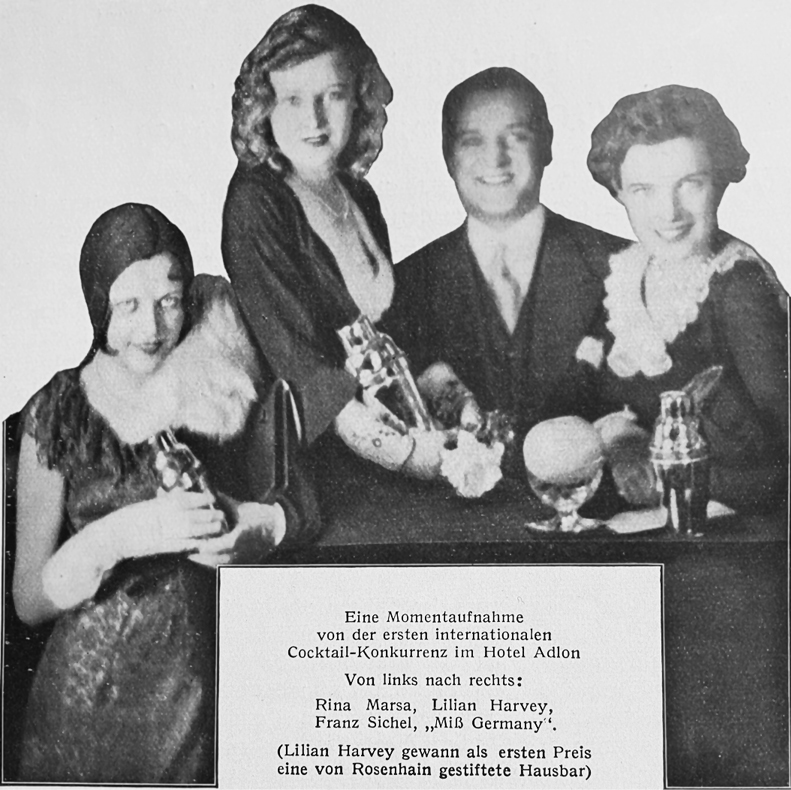cocktail contests have existed almost as long as modern bartending; as far back as 1869, celebrity bartender Harry Johnson boasted of winning a competition in New Orleans and subsequently being crowned the best bartender in America. See Johnson, Harry. Almost as long ago, bartenders and judges began complaining that the recipes entered in cocktail competitions are needlessly complicated; an 1889 New York newspaper reports disapprovingly of a cocktail contest entry requiring “eggs of a certain age, laid at the change of the moon, and by chickens of a certain breed.”
Cocktail contests generally require competitors to create a new cocktail or cocktails, sometimes with surprise ingredients, and (because most contests are sponsored) usually featuring a sponsor’s brand. Moving with the times, modern-day competitions may also reward, in whole or in part, a bartender’s ability to pair cocktails with food, get branded cocktails listed on their establishment’s menu, or publicize such cocktails; even a bartender’s potential appeal as an ambassador of the contest itself, the sponsoring brand, or its parent company comes into play. Vagaries of national laws allow some contests to offer multiple large cash prizes, while others may not offer any financial incentive beyond bragging rights.
Perhaps the longest continually running international cocktail contests have been those conducted under the auspices of the International Bartenders Association (IBA), which was founded in 1951 and to which national bartender guilds associate themselves. The IBA World Cocktail Championships (WCC) are open to member bartenders only and are held annually; national guilds hold contests to select that country’s delegate(s) to the world finals. The gap between the spirit-forward, classically inspired cocktails that became popular in modern bars starting in about 1990 and the kinds of recipes that typically win the WCC continues to widen. WCC-winning cocktails typically feature layers of flavor dependent on sugar from syrups, juices, or liqueurs and generally relegate the base spirit from a leading to a supporting role in the cocktail. See iba. The longest almost continually running international branded cocktail contest is the Martini & Rossi vermouth company’s annual Martini Grand Prix, which began as the Paissa Prize in 1966 and is open to all bartenders. See Martini & Rossi.
With a global shift to drinking in bars rather than at home, branded competitions have proliferated to saturation point. These heavily sponsored contests have led to a backlash, with many bartenders declining to enter for fear of appearing to have “sold out.” There have even been some self-organized, aggressively unsponsored contests where each entrant pays an entry fee and the winner takes all. Winning—or even just placing—in a large, well-respected, contest, however, has huge value to a bartender. In addition to any prize money or trips, he or she gets to meet senior marketing staff from the brand, gets profiled in the media (often worldwide), and may get the chance to be hired to teach about the contest in countries that host it in subsequent years. Competing may also give entrants exclusive access to unique tastings, trainings, and distillery visits. Brands’ return on investment is an enhanced reputation among, and relationships with, bartenders; inspiration for new products or signature cocktails; and publicity, which can spill over into consumer awareness.
Archives of Martini. “From Paissa Prize to the Martini Grand Prix.” PDF, 2015.
Johnson, Harry. The New and Improved Bartenders Guide. New York, 1882.
The International Bartenders’ Association website. https://iba-world.com (accessed February 25, 2021).
“Recognising a New Art.” Brooklyn Eagle, 1889.
By: Philip Duff
The winners of an amateur cocktail competition held at the Hotel Adlon in Berlin, 1930. The actress Lilian Harvey, second from left, came in first with her Hocus Pocus Cocktail (equal parts gin, Cointreau, and lemon juice; see White Lady).
Wondrich Collection.
 The winners of an amateur cocktail competition held at the Hotel Adlon in Berlin, 1930. The actress Lilian Harvey, second from left, came in first with her Hocus Pocus Cocktail (equal parts gin, Cointreau, and lemon juice; see White Lady). Source: Wondrich Collection.
The winners of an amateur cocktail competition held at the Hotel Adlon in Berlin, 1930. The actress Lilian Harvey, second from left, came in first with her Hocus Pocus Cocktail (equal parts gin, Cointreau, and lemon juice; see White Lady). Source: Wondrich Collection.
